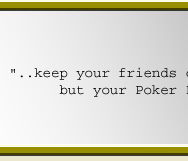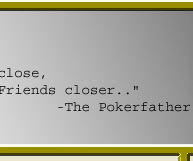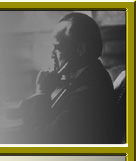(Click Here for the Latest Online Poker News Stories)
Copyright 2005 MSNBC.com
September 15, 2005
HEADLINE:
Five unconventional tips to poker success
Author:
Charles Mousseau of PokerFan.com
BODY:
Want to make a splash at tournament? Follow these
guidelines
There's a reason that conventional advice is called “conventional,”
and it's related to the same reason that obvious plans are considered
“obvious” — they are ultimately effective.
I, ever the contrarian, always have looked off the beaten path
to find ways to improve my poker success. Not just those that
are different for their own sake, but those that I feel are effective,
ones I can integrate into my own play, and they just haven't been
talked about by big-name authors.
I'll leave the mainstream advice to the mainstream authors, but
if you are curious, here are the best five things I do to help
my tournament success that no one, to the best of my knowledge,
has discussed.
Poker Tip No. 1:
Watch a few hands unfold at your table from a different physical
location.
You hear athletes and poker players alike talk about a situation
known as “being in the groove.” You're almost seeing
things before they happen, letting intuition take over the micromanaging
so you can start absorbing things in the big picture.
It can be very effective, but the danger is this: It isn't a
big step from being “in the groove” to being “in
a rut.”
To combat this, I have developed a little trick which I first
used back in my chess-playing days, where for a few of my opponent's
turns, I would stand behind him and observe the game “from
a distance,” in an effort to force myself to see the game
not just as my game, but simply, a game.
The next time you are at the poker table, and you're going to
get up and go for a stretch, or to get a soda, stand back from
the table and watch the action. Pretend you aren't even involved.
When they're about to deal, sit down and get your cards, play
the hand if it is worthy. When you're out of the hand, stand back
up. Walk around and watch.
This helps you with your viewpoint, both in the figurative and
in the optical sense. By standing up, you might be able to see
things that an obstruction would otherwise prevent, such as one
player having a lot more chips than you thought, or someone else
acting generally irritable under certain circumstances. It might
help you down the road.
Even without such a revelation, the forcing of the point of view
from your table to a generic table and back again can help keep
you fresh and observant, two things crucial to succeeding in a
poker tournament.
Poker Tip No.
2: Track one highly specialized statistic from
tournament to tournament.
Most internet poker
sites offer the ability to track general stats about how often
you call in certain positions. I've never seen how these can be
useful, except in the most abstract of senses, because of the
amount of extrapolation required beyond just the number. Seeing
the flop 50 percent of the time only tells you that you've seen
the flop half the time, but says nothing about why you have done
so, and there's something worse as well:
How do you put a goal to that? What percentage of flops, all
things equal, do you want to be seeing? Again, it is very, very
difficult to answer this without answering a lot of assumptions
beforehand.
If you are going to track a statistic in poker,
then track one that has some specific and immediate value, and
one that has a goal for comparison purposes. Change it from time
to time as you focus on different areas of the game you would
like to analyze more closely.
Most recently, the statistic I have been tracking involves how
often I make an egregious overbet preflop (say, a raise to over
10 times the big blind), how often I get called, and how often
I have a big edge (at least 3:2 by my definition).
So far, in the past 12 times I have made such a bet preflop,
I have gotten action on 11 of them. One of those times I was only
an 11:9 favorite (when I ran my queens into ace-king), and the
other 10 featured me being at least a 3:2 favorite.
The reason I came about tracking this statistic was when I made
a sizable reraise preflop with pocket kings, and the original
raiser had aces. Although in retrospect I didn't see how I could
play that differently, it did suggest to me that I should focus
on this, as I was curious if I was overplaying hands preflop too
much. I can look back on this percentage and see that I have been
making a healthy profit with my haphazard-looking preflop play.
This is because I have been careful about who I make such a play
against, which of course segues nicely into our next bit:
Poker Tip No.
3: Categorize the other players by first focusing
on them as “opportunities”
In no-limit hold’em, as I've said in the past, the name
of the game is "opportunity," as opposed to "efficiency"
in limit hold’em. In limit hold’em tournaments, I
do something very analogous, and I think about each player in
terms of how I would play a hand against them in the most efficient
manner. A player who always tries a river bluff if you raise the
flop and check the turn, for instance, gives
a strong suggestion on the most efficient way for me to play
my medium-strength holdings. A player who will check-raise the
flop and bet the turn with as little as top pair will be the one
against whom I bet out my big made hand on the flop.
In no-limit hold’em, playing your opponent is just as big
a factor as playing your cards, and arguably more so. Naturally,
you will be observing your opponents, how they play, how they
react to certain situations, and so forth.
For instance, you see a player with a huge chip stack call under
the gun, then call an all-in raise to nine times the big blind
with as little as ace-seven offsuit. Traditional thinking holds
that you start classifying him as a loose player, a passive player,
a calling station and so forth.
The first thing that pops in my head is this: Seat No. 3's opportunity:
Big preflop edges.
In essence, I've synthesized this information into a more usable
form. I find personally that by doing this, I can access this
precompiled information a lot faster, and this is the most important
thing to know about players.
This doesn't stop until each player at the table is categorized
as an opportunity, and then I can start focusing on more subtle
and specific things.
Poker Tip No.
4: Look for opportunities to make “unpaid
advertizing”
Most everyone knows what is meant by the term "advertizing":
the voluntary showing of hands to "tell people" what
kind of player you are.
I'm a fan of simply playing the game in what looks like the most
profitable way, and letting the other players decide what kind
of player I am (so I can, naturally, be the exact opposite at
a strategic time). Nevertheless, from time to time, I do like
to influence my image in subtle ways.
Raising preflop and showing everyone you had pocket aces is a
nice way to show people you are capable of raising with aces,
but most people will bear in mind with a grain of salt that they
are seeing something which you are showing them for their own
benefit.
Instead, if I want to convince my opponents I am tight, I do
this: Find a hand where a textbook bluff would most certainly
succeed, or would most certainly be attempted, and simply not
take it. A good example would be where the flop comes paired low,
pairs again on the turn, and nothing comes on the river. They
check to me on every street, and when they check to me on the
river, I announce my hand and turn it over, as natural as can
be.
Yes, it probably did cost me the pot to play the hand that way.
It's no more than I would have had to spend playing a bad hand
aggressively for the expressed purpose of showing it down at the
end, and I think it's a far more effective way to do it.
Poker Tip No.
5: Stay positive.
I don't mean just being able to say "yeah, I like poker"
at the end of the day. I mean having your aces cracked —
or running your kings into aces — and forcing yourself to
release that energy in a positive way.
Joke about your bad luck. Joke about the other guy's good luck.
Roll your eyes, faint and act as if you had been shot through
the heart with a harpoon. I go the self-deprecating route, along
the lines of "Yeah, I play that garbage, I get what I deserve;
if only they were suited!" Do whatever you need to do to
get it out of your system, but get it out.
If you don't think it can be done reasonably indoors, then go
outdoors, muffle your mouth with your fist and scream as loud
as you can. The passers-by might wonder why you are apparently
trying to swallow your own arm. No matter.
However dumb you look, however dumb you sound, and however dumb
you might feel, it is clearly nowhere near as dumb as you will
look, sound and feel if you go on tilt and spritz away more chips.
A crisis of bad luck shall last exactly one hand — the hand
it made you lose. Once it starts influencing your play on further
hands, then it's gone from bad luck to bad play on your part.
It's not easy, and it's a goal I still fail to meet on a regular
basis. But I recognize it as something that I must improve if
I want success in poker.
Charles Mousseau is a respected poker player and writer. He contributes
articles in his Poker column at PokerFan.com.
More Poker Tips
Please also see our articles on:
"The
Poker Father's Top 10 Poker Tips for Playing Poker"
"Ten
Tips to Improve Your Online Poker Game"
"Texas
Hold'em Tournament Tips"
Downloaded from
the World Wide Web on September 15, 2005:
http://msnbc.msn.com/id/9341135/
|
(Click Here for the Latest Online Poker News Stories)
|






